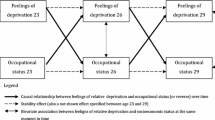Abstract
Occupational data are central to much research in the field of social stratification. Yet there is little consensus on how such data are most appropriately classified and scaled. We evaluate occupational scales currently in use on the basis of a fourfold typology. This cross-classifies scales, on the one hand, according to whether they are intended to be ‘synthetic’ or ‘analytic’ and, on the other, according to whether they are based on ‘subjective’ or ‘objective’ data. Focusing chiefly on issues of validity, we argue that scales of the analytic-objective type are those which, for most purposes, can be used to best advantage in stratification research. We illustrate our argument by applying scales of occupational earnings and occupational status in analyses of the worklife occupational mobility of men in Britain, using the data-set of the National Child Development Study.
Similar content being viewed by others
References
Bottero W., Prandy K.: Social interaction and social stratification. Br. J. Sociol. 54, 177–197 (2003)
Bowles S., Gintis H.: Does schooling raise earnings by making people smarter?. In: Arrow, K., Bowles, S., Durlauf, S. (eds) Meritocracy and Economic Inequality, Princeton University Press, Princeton (2000)
Bowles S., Gintis H., Osborne M.: The determinants of earnings: a behavioural approach. J. Econ. Lit. 39, 1137–1176 (2001)
Bukodi E, Dex S.: Bad start: is there a way up? Gender differences in the effect of initial occupation on early career mobility in Britain?. Eur. Sociol. Rev. 26, 431–446 (2010)
Chan, T.-W. (ed.): Social Status and Cultural Consumption. Cambridge University Press, Cambridge (2010)
Chan T.-W., Goldthorpe J.H.: Is there a status order in contemporary British Society? Evidence from the occupational structure of friendship. Eur. Sociol. Rev. 20, 383–401 (2004)
Chan T.-W., Goldthorpe J.H.: Class and status: the conceptual distinction and its empirical reference. Am. Sociol. Rev. 72, 512–532 (2007)
Cox D.R., Jackson M., Lu S.: On square ordinal contingency tables: a comparison of the social class and income mobility for the same individuals. J. Roy. Stat. Soc. Ser. A 172, 483–493 (2009)
Duncan O.D.: A socioeconomic index for all occupations. In: Reiss, A.J. (ed.) Occupations and Social Status, Free Press, New York (1961)
Erikson R., Goldthorpe J.H.: The Constant Flux: A Study of Class Mobility in Industrial Societies. Clarendon Press, Oxford (1992)
Evans G.: On tests of validity and social class: why Prandy and Blackburn are wrong. Sociology 32, 189–202 (1998)
Featherman D.L., Hauser R.M.: Prestige or socioeconomic scales in the study of occupational achievement?. Sociol. Methods Res. 4, 403–422 (1976)
Ganzeboom H.G.B., De Graaf P.M., Treiman D.J.: A standard socio-economic index of occupational status. Soc. Sci. Res. 21, 1–56 (1992)
Goldthorpe J.H.: On Sociology Vol. 2, 2nd edn. Stanford University Press, Stanford (2007)
Goldthorpe J.H., Hope K.: Occupational grading and occupational prestige. In: Hope, K. (eds) The Analysis of Social Mobility: Methods and Approaches, Clarendon Press, Oxford (1972)
Goldthorpe J.H., Hope K.: The Social Grading of Occupations: A New Approach and Scale. Clarendon Press, Oxford (1974)
Goldthorpe J.H., McKnight A.: The economic basis of social class. In: Morgan, S., Grusky, D.B., Fields, G.S. (eds) Mobility and Inequality: Frontiers of Research from Sociology and Economics, Stanford University Press, Stanford (2006)
Grusky D.B., Van Rompaey S.E.: The vertical scaling of occupations: some cautionary comments and reflections. Am. J. Sociol. 97, 1712–1728 (1992)
Grusky D.B., Weeden K.: Decomposition without death: a research agenda for the new class analysis. Acta Sociol. 44, 203–218 (2001)
Hauser R.M., Warren J.R.: Socioeconomic indexes for occupations: a review, update, and critique. Sociol. Methodol. 26, 177–298 (1997)
Hodge R.W.: The measurement of occupational status. Soc. Sci. Res. 10, 396–415 (1981)
Jacobs S.: Trends in women’s career patterns and in gender occupational mobility in Britain. Gend. Work Organ. 6, 32–46 (1999)
Jencks C., Perman L., Rainwater L.: What is a good job? A new measure of labor-market success. Am. J. Sociol. 93, 1322–1357 (1988)
Jones F.L., McMillan J.: Scoring occupational categories for social research: a review of current practice, with Australian examples. Work Employ. Soc. 15, 539–563 (2001)
McGovern P., Hill S., Mills C., White M.: Market, Class and Employment. Oxford University Press, Oxford (2007)
National Opinion Research Center: jobs and occupations: a popular evaluation. Opinion News (September 1947)
Nickell S.: The determinants of occupational success in Britain. Rev. Econ. Stud. XLIX, 43–53 (1982)
Office of National Statistics : The National Statistics Socio-economic Classification: User Manual. Palgrave Macmillan, London (2005)
Prandy K.: The revised Cambridge Scale of occupations. Sociology 24, 629–655 (1990)
Prandy K., Lambert P.S.: Marriage, social distance and the social space: an alternative derivation and validation of the Cambridge Scale. Sociology 37, 397–411 (2003)
Rose M.: Good deal, bad deal? Job satisfaction in occupations. Work Employ. Soc. 17, 503–529 (2003)
Stewart A., Prandy K., Blackburn R.M.: Social Stratification and Occupations. Macmillan, London (1980)
Treiman D.J.: Occupational Prestige in Comparative Perspective. Academic Press, New York (1977)
Warren J.R., Sheridan J.T., Hauser R.M.: Choosing a measure of occupational standing: how useful are composite Measures in analyses of gender inequality in occupational attainment?. Sociol. Methods Res. 27, 3–76 (1998)
Weeden K., Grusky D.B.: The case for a new class map. Am. J. Sociol. 111, 141–212 (2005)
Wright E.O.: Classes. Verso, London (1985)
Author information
Authors and Affiliations
Corresponding author
Rights and permissions
About this article
Cite this article
Bukodi, E., Dex, S. & Goldthorpe, J.H. The conceptualisation and measurement of occupational hierarchies: a review, a proposal and some illustrative analyses. Qual Quant 45, 623–639 (2011). https://doi.org/10.1007/s11135-010-9369-x
Published:
Issue Date:
DOI: https://doi.org/10.1007/s11135-010-9369-x



